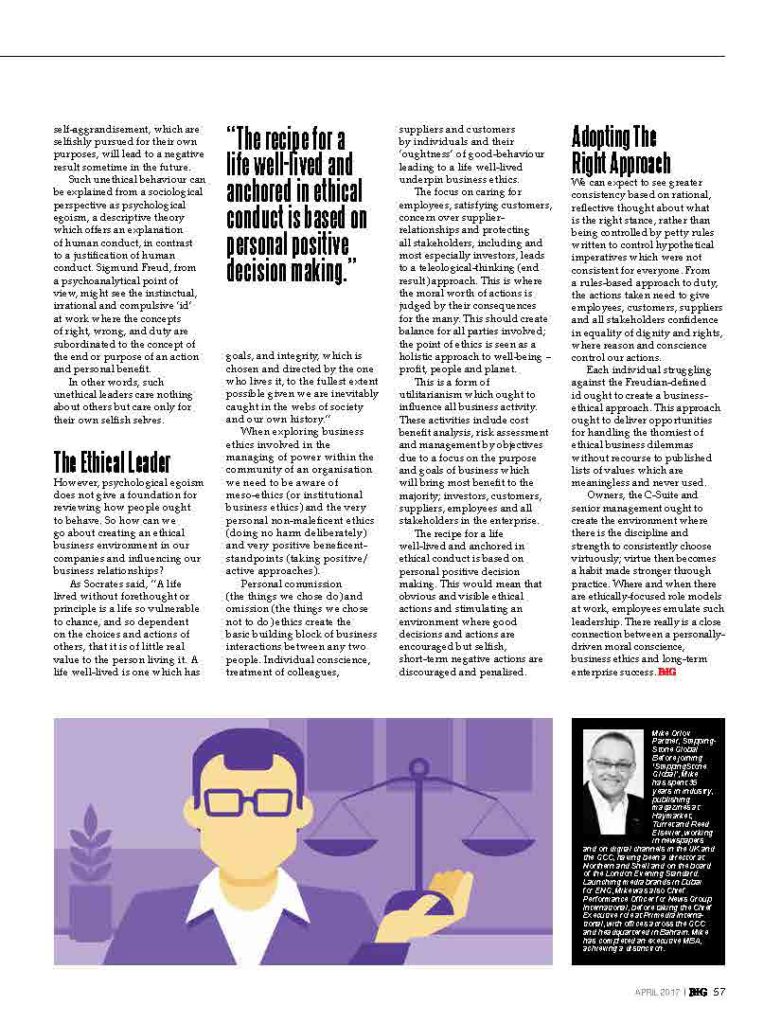

The Importance of Ethical Leadership
Over recent months, we have been watching news about British Home Stores, Toyota, Rolls Royce, BT, Samsung, Toshiba, Toyota and a range of other companies asking ourselves where have the ethically-driven business leaders gone? Ethical leadership can be described as your demonstration of regular and appropriate conduct through your actions, how you handle your interpersonal relationships, your personal-promotion of conduct to your people through effective two-way communication, reinforcement of good behaviour, and manifesting your values through your decision-making.
We know, through an avalanche of studies, ethically-driven decision-making and leadership brings credibility, respect, process, motives and values trust and encourages a positive environment where employees, customers and suppliers engage in lucrative long-term relationships affecting all stakeholders.
Of course, there are short-term profits to be made by sociopathic narcissists; just look at Bernard Madoff’s story. After years of ‘ripping people-off’ and living an amazingly wealthy life, his Ponzi scheme can unstuck and he was sentenced to a number of lifetimes in prison for his unethical actions. Bad decisions, driven by the urge for short-term benefits, can often lead to negative results over the longer term. Being an ethically-driven business leader is also the most effective way to protect and grow enterprises over the long-term.
We are sure most of you can list a number of unethical-decisions you have seen and have also been affected by; backwash hurting individuals created by unethical actions driven by the belief which states ‘the ends we are setting out to achieve warranted such negative by-products of unethical activity’. Often unethical business leaders will state they are doing nothing illegal or nothing they thought would be capable of damaging the business. There is often no thought about their actions being unsafe but they fail to recognise decisions driven by self-aggrandisement, which are selfishly pursued for their own purposes, will lead to a negative result sometime in the future.
Such unethical behaviour can be explained from a sociological perspective as psychological egoism, a descriptive theory which offers an explanation of human conduct, in contrast to a justification of human conduct. Sigmund Freud, from a psychoanalytical point of view, might see the instinctual, irrational and compulsive ‘id’ at work where the concepts of right, wrong, and duty are subordinated to the concept of the end or purpose of an action and personal benefit.
In other words such unethical leaders care nothing about others but care only for their own selfish selves.
However psychological egoism does not give a foundation for reviewing how people ought to behave. So how can we go about creating an ethical business environment in our companies and influencing our business relationships?
As Socrates said a life lived without forethought or principle is a life so vulnerable to chance, and so dependent on the choices and actions of others, that it is of little real value to the person living it. A life well-lived is one which has goals, and integrity, which is chosen and directed by the one who lives it, to the fullest extent possible given we are inevitably caught in the webs of society and our own history.
When exploring business ethics involved in the managing of power within the community of an organisation we need to be aware of meso-ethics (or institutional business ethics) and the very personal non-maleficent ethics (doing no harm deliberately) and very positive beneficent-standpoints (taking positive/active approaches).
Personal commission (the things we chose do) and omission (the things we chose not to do) ethics create the basic building block of business interactions between any two people. Individual conscience, treatment of colleagues, suppliers and customers by individuals and their ‘oughtness’ of good-behaviour leading to a life well-lived underpin business ethics.
The focus on caring for employees, satisfying customers, concern over supplier-relationships and protecting all stakeholders, including and most especially investors, leads to a teleological-thinking (end result) approach. This is where the moral worth of actions is judged by their consequences for the many. This should create balance for all parties involved; the point of ethics is seen as a holistic approach to well-being – profit, people and planet.
This is a form of utilitarianism which ought to influence all business activity. These activities include cost benefit analysis, risk assessment and management by objectives due to a focus on the purpose and goals of business which will bring most benefit to the majority; investors, customers, suppliers, employees and all stakeholders in the enterprise.
The recipe for a life well-lived and anchored in ethical conduct is based on personal positive decision making, obvious and visible ethical actions and stimulating an environment where good decisions and actions are praised and encouraged but selfish, short-term negative actions are discouraged and penalised.
We can expect to see greater consistency based on rational, reflective thought about what is the right stance, rather than being controlled by petty rules written to control hypothetical imperatives which were not consistent for everyone. From a rules-based approach to duty, the actions taken need to give employees, customers, suppliers and all stakeholders confidence in equality of dignity and rights, where reason and conscience control our actions.
Each individual struggling against the Freudian-defined id ought to create a business ethical approach. This approach ought to deliver opportunities for handling the thorniest of ethical business dilemmas without recourse to rule-ridden corporate social responsibility programmes or published lists of values which are meaningless and never used.
Owners, the C Suite and senior management ought to create the environment where there is the discipline and strength to consistently choose virtuously; virtue then becomes a habit made stronger through practice. Where and when there are ethically-focused role models at work, employees emulate such leadership. There really is a close connection between a personally-driven moral conscience, business ethics and long-term enterprise success.
